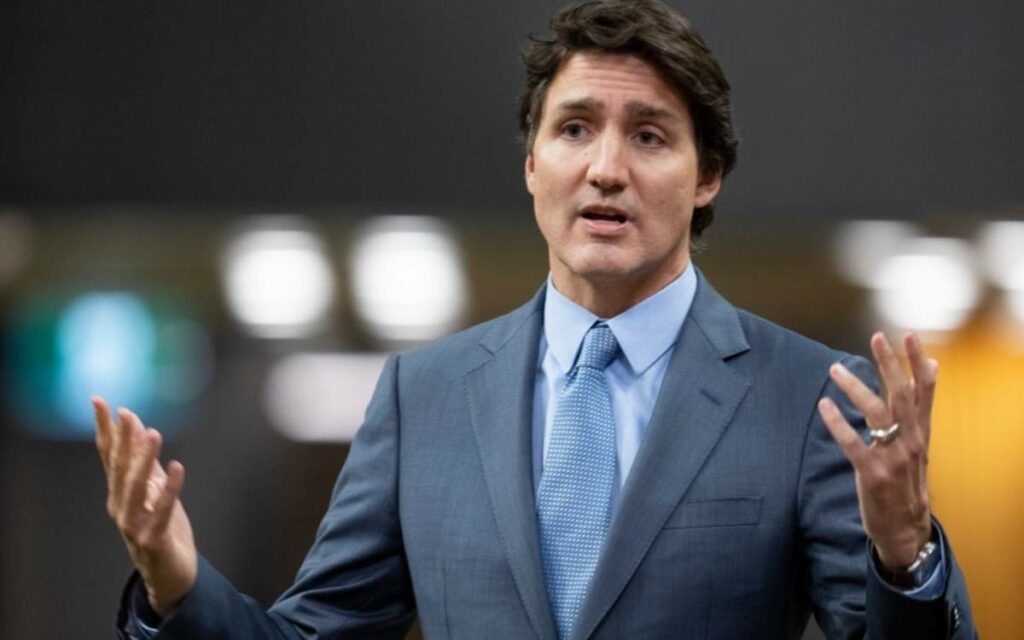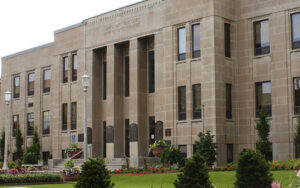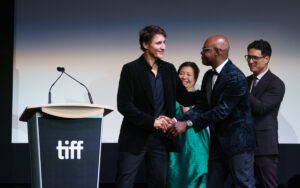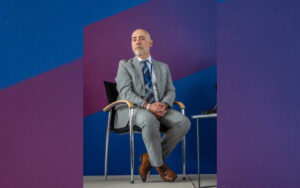
With Parliament returning Monday, the PM has resumed his role at centre stage. But what lies ahead for one of Canada’s finest political performers remains an enigma. Photo credit: The Canadian Press/Adrian Wyld
Should I stay or should I go now?
Should I stay or should I go now?
If I go, there will be trouble
And if I stay it will be double
So come on and let me know
There was the usual excitement in Ottawa this week as MPs returned from their Christmas recess. Blowing across Parliament Hill for most of the week MPs were greeted by a crisp -7 C wind – and on the wind that unmistakable refrain from The Clash’s hit song “Should I stay or should I go?”
Each day the lights of the House of Commons shone on the combatants, Prime Minister Justin Trudeau and Conservative Leader Pierre Poilievre, as they exchanged polispeak. Poilievre delivered rapid-fire zingers; Trudeau responded with scripted non sequiturs. The political theatre had resumed with its expected tone and pace, except for the unabating queries about the PM’s future.
In the lead up to the re-opening of Parliament, there was great speculation bandied about by the national press corps regarding Trudeau’s political future.
Campbell Clark baldly put the question in his Globe and Mail op ed “To run or not to run?” when he wrote, “This year, 2023, is when Mr. Trudeau will really have to decide.” The Hill Times posed the personal question: “Does Trudeau have the fire in his belly to stay in the game?” The paper editorialized: “…no one is pushing Justin Trudeau out the door. But it would be refreshing if he could take a deep look inside and tell the rest of us if he still has the fire in his belly to stay in the game—the way New Zealand Prime Minister Jacinda Arden did.”
Through January, Canadians were treated to feature columns in mainstream media written with an apparent attempt to help the PM frame his legacy. There was a flattering piece in the Toronto Star by Susan Delacourt, who lobbed the PM softies such as, “What keeps you up at night?” Another fluff piece appeared in the Globe and Mail, written by Liberal apologist Lawrence Martin, who lauded Trudeau’s toughness: “…he’s not all that troubled by the torrents of abuse and derision…. The more the haters come at Justin Trudeau, the more he will be determined to hold on to power.”
The most embarrassing piece of adoration was presented by John Ibbitson in his year-end tribute hailing Trudeau as a remarkable PM. Ibbitson tells us that Trudeau’s “ambitious agenda” laid before Canadians in 2015 “has been largely realized.” He asserts that Canada is in a better place as a result of Trudeau’s leadership: in world trade, immigration, the fight against global warming, progressive politics, decriminalizing drugs, bringing Canadians through the Great Pandemic, and more. Ibbitson concludes: “If Justin Trudeau wanted to be known as a transformative prime minister, he succeeded.”
The exceedingly high praise and puffery from the likes of Delacourt and Ibbitson has put a spring in the step of the PM as he assumed his role at centre stage. Through the week, a reinvigorated Trudeau spent a great deal of his time in Question Period sidestepping any responsibility for the latest revelations regarding the $100 million worth of contracts awarded to the McKinsey & Company.
As the plot is unfolding, it appears the scandalous arrangements for McKinsey are similar to the cozy relationships struck between SNC Lavalin and the Prime Minister’s Office. Yet, unfazed, the PM struck a pose in the House to swat away the facts about his fondness for former McKinsey senior executive Domenic Barton. Trudeau disavowed his friend Domenic. Then at a MP committee, Barton complemented the PM’s performance with repeated denials of any friendship.
A much more spectacular scene occurred on Wednesday when the PM was being pressed by Poilievre about the financial strain being felt by Canadians. The Opposition Leader criticized the government’s fiscal record and its gross overspending by citing criticisms made by Bill Morneau and Mark Carney – the Liberal government’s former finance minister and former governor of the Bank of Canada. Trudeau sprang to his feet to debate the points and then chastised Poilievre for “stumbling over himself” by using quotes from “random Liberals.”
Even for Justin Trudeau this line is too incredible, to debase these men of their Liberal pedigree. To be certain, Trudeau has been personally stung by the frank admissions of his former finance minister. In Bill Morneau’s bestselling book, Where to from Here: A Path to Canadian Prosperity, and in some forthright interviews promoting his book, Morneau’s assessment of the PM and his government’s performance is damning:
- “We lost the agenda. During the period when the largest government expenditures as a portion of GDP were made in the shortest time since the advent of World War II, calculations and recommendations from the Ministry of Finance were basically disregarded in favour of winning a popularity contest.”
- “My job of providing counsel and direction where fiscal matters were concerned had deteriorated into serving as something between a figurehead and a rubber stamp.”
- Morneau suggests Trudeau gave the reins to his backroom operatives, like Gerald Butts: “Carefully crafted and strategically employed, they drove conclusions before an elected cabinet minister could finish reading the briefing documents, let alone reach a reasoned conclusion on the subject and consider the best way forward.”
On Trudeau’s character, Morneau stated: “I came to realize that while his performance skills were superb, his management and interpersonal communication abilities were sorely lacking.”
Morneau’s disillusionment with Justin Trudeau has been recounted by others who left Ottawa’s political fray with the same sour feelings about the PM: recall the first-hand accounts by former celebrated parliamentarians Jody Wilson Raybould, Jane Philpott, and Celina Chavannes. There are many long-serving, stalwart Liberals who have abandoned the party having lost confidence in Trudeau. In the wake of the government’s low point having invoked the Emergencies Act, Stephen LeDrew, the longest-serving president of the Liberal Party of Canada, put it this way about Trudeau’s leadership: “He has cheapened public discourse and public life… the pain inflicted by this government has almost brought us to the tipping point.”
Still PM Trudeau commands centre stage in Ottawa. He and his operatives have recently doubled down on his political games of dividing Canadians by purposefully highlighting controversial wedge issues. For example, Trudeau made racial accusations against conservatives in Delacourt’s Toronto Star feature: “He’s [Poilievre] playing and preying on the kinds of anger and anxieties about some Canada that used to be — where men were men and white men ruled.”
He followed up the accusation this week by underscoring Black History Month with the statement “Canada has a history of anti-Black racism…” (Trudeau takes every opportunity to accentuate racial tensions and repeatedly fails to mention factual Canadian history, such as Harriet Tubman and those involved with the Underground Railroad.)
Another sorry example of this deployable tactic is Trudeau’s heralded appointment this week of the racially-biased Amira Elghawaby as the government’s new Special Representative on Combatting Islamophobia. Trudeau was fully aware of Elghawaby’s reputation for making intolerant, judgmental statements about Quebecers, conservative-minded people, and people of British descent. But, that is precisely the point. Konrad Yakabuski of the Globe and Mail put it best when he exposed the PM’s cynical appointment: “Her nomination is meant to delight outspoken interest groups whose support is critical to Liberal political fortunes.”
For political pundits and national columnists it has proven difficult to anticipate the PM’s next act or political power play. In January, the pundits were certain there was going to be a cabinet shuffle; it did not materialize. Whispers of a spring election persist. The current rumour circulating through Hill offices is that Chrystia Freeland will be leaving Ottawa in the coming weeks, jettisoned away by Klaus Schwab for a position at the World Economic Forum, or some suggest by her friend and mentor George Soros. Everywhere, everyone is talking about the latest polls that have the Tories catapulting to their largest lead in more than a decade.
And with all this, Justin Trudeau struts back and forth across his stage. Can you not hear that music?
This indecision’s buggin’ me
If you don’t want me, set me free
Exactly whom I’m supposed to be
Don’t you know which clothes even fit me?
Come on and let me know
Should I cool it or should I blow?

Chris George is an advocate, government relations advisor, and writer/copy editor. As president of a public relations firm established in 1994, Chris provides discreet counsel, tactical advice and management skills to CEOs/Presidents, Boards of Directors and senior executive teams in executing public and government relations campaigns and managing issues. Prior to this PR/GR career, Chris spent seven years on Parliament Hill on staffs of Cabinet Ministers and MPs. He has served in senior campaign positions for electoral and advocacy campaigns at every level of government. Today, Chris resides in Almonte, Ontario where he and his wife manage www.cgacommunications.com. Contact Chris at chrisg.george@gmail.com.




















